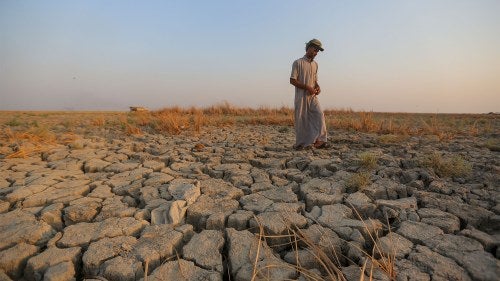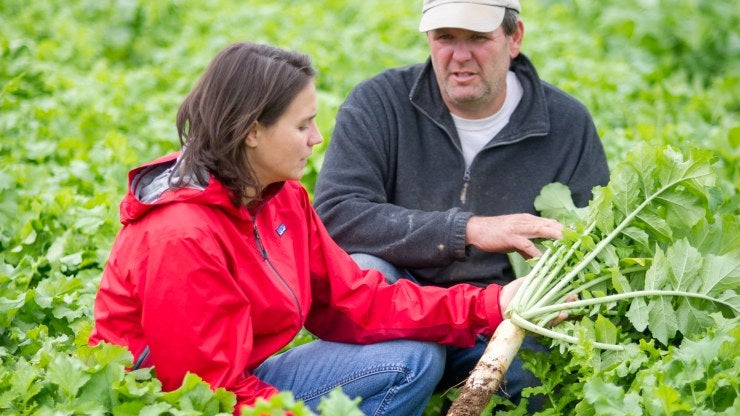Poppy Ban, Timeless Tractor, and Rural Investments
Check out our roundup of the week's top news and research in food, agriculture, and global development.

Top Story
The Hidden Cost of Food
The UN reports that the health and environmental damage caused by food production costs $10 trillion yearly, equivalent to 10 percent of the worldwide GDP. Poor diets contribute to $7.3 trillion in costs, leading to conditions like diabetes and heart disease. As countries grow wealthier and processed foods become more prevalent, the FAO anticipates a rise in the financial burden, highlighting the need for nuanced solutions beyond simply increasing food prices.
Council Insights
A Regenerative Future
"Regenerative agriculture is emerging as an approach to farming that aims to increase farm resiliency by improving soil health, restoring natural resources, and increasing biodiversity through integrated farming practices,” write food and agriculture experts in a report with the Center on Global Food and Agriculture. Check out the report to learn more.

Food and Agriculture
Rising Prices
Prices of basic European foodstuffs are skyrocketing. Olive oil prices have increased 75 percent since January 2021, while potato prices surged by 53 percent. Despite an overall inflation rate of 2.9 percent in October, food inflation remains at 7.5 percent, disproportionately affecting low-income families.
Poppy Replacement
The Taliban's ban on poppy cultivation has lost Afghan farmers over $1 billion in opium sales. Formally implemented in April 2022, the ban led to a 95 percent decline in opium cultivation. Afghanistan, once the world's largest opium producer, relied on opiates for nine to 14 percent of its national GDP before the ban. As poppy cultivation decreased, the country witnessed a rise in methamphetamine production, making it the world's fastest-growing producer of synthetic drugs.
Chatting with China
A US agriculture delegation, including the US Soybean Export Council and US Grains Council, is in Beijing to boost farm trade with China following non-binding agreements for billions of dollars in produce, primarily soybeans. The visit aims to address issues like China's anti-dumping measures on US distillers dried grains and trade competition from Brazil.
Deeper Dive
What Are the Effects of the Taliban’s Poppy Ban?
Since returning to power in 2021, the Taliban pledged to eradicate illegal drug production. The UN Office on Drugs and Crime report reveals a collapse in poppy cultivation from 233,000 hectares in 2022 to 10,800 in 2023, leading to a drop in opium production from 6,200 tons to 333 tons. The sudden contraction of the opium economy is expected to have humanitarian consequences for vulnerable rural communities, impacting farmers' incomes, which fell from $1.36 billion in 2022 to $110 million in 2023.
Resilience
Timeless Tractor Tech
Farm machinery manufacturers are expanding retrofitting services to equip old tractors with new technologies to help farmers access better technology at cheaper prices. Retrofits can equip tractors built as far back as the 1970s with automated precision instruments to better plant seeds and spray crops, saving farmers hundreds of thousands of dollars on new equipment.
DC Report
Biden Touts Rural Investments
Amid growing criticism of his administration’s handling of the Israel-Hamas war, President Biden travelled to a Minnesota farm to begin a tour of rural communities and highlight federal investments totaling over four billion dollars in rural infrastructure, broadband, agriculture, and clean energy. In his remarks, Biden criticized agricultural consolidation and the loss of family farms.
Big Actors
Opinion: India's Expansion
Indian Prime Minister Narendra Modi is seeking to strengthen his country’s ties with the African continent through increased diplomatic contact and trade involvement, including in the agriculture and clean energy sectors. India has recently become one of the top five investors in Africa, and could help African countries improve agricultural productivity through providing inputs like seeds, fertilizer, and pesticides.
Big Ideas
Carbon Tax Future
Denmark is calling on the EU to implement a carbon tax on farmers, with agriculture set to become the bloc’s biggest polluter by 2040. The Nordic country is suggesting a cap-and-trade system similar to the energy and industrial sectors as a way to achieve ambitious emissions reductions goals. Domestically, Denmark is considering a carbon tax on beef and dairy production and could become only the second country in the world after New Zealand to do so.
Ask an Expert
What can account for the increasing water stress around the world?
“The irony is that the increasing stress put on our water is, in part, a direct reflection of the success we’ve had in bringing people out of extreme poverty and into greater agricultural productivity. As people rise out of poverty, they demand more water intensive goods, foods, and more reliable water access. Agriculture has become increasingly productive and more efficient. This is a good thing, but it puts new stresses on an already stressed system and we’ve done little to prepare for this growth...Despite agriculture’s enormous gains in productivity, its scale has become extremely water and carbon intensive.”
—Nonresident Fellow Michael Tiboris in GFFT


Have a question about food and agriculture? Ask one of our experts at the Center on Global Food and Agriculture to get an answer in next week's Global Food for Thought!
Council Events
Other Upcoming Events
National Agricultural Marketing Summit
Date: November 12 – 14
Seeding Regenerative Futures: Real Climate Solutions in Agriculture
Date: November 14
Time: 2:00 – 4:00 p.m. CT
The Political Economy of Food System Transformation: Pathways to Progress in a Polarized World
Date: November 14
Time: 3:00 – 4:30 p.m. ET
Tackling Obesity and Noncommunicable Diseases in Mexico: A Policy Approach
Date: November 21
Time: 9:00 – 10:30 a.m. ET
UN Climate Change Conference of the Parties (COP28)
Date: November 30 – December 12
Land Acknowledgement Statement
The Center on Global Food and Agriculture recognizes it occupies the ancestral land of the Kiikaapoi, Peoria, Kaskaskia, Bodwéwadmi, and Myaamia people. Indigenous communities around the world disproportionately experience the pressures of climate change, global conflicts, and the COVID-19 pandemic, while simultaneously stewarding 80 percent of the world’s biodiversity. These Indigenous tribes and nations are the original owners of this land and continue to be systemically erased by policies and practices that ignore their histories. To learn more about Indigenous foodways and practices, check out our 2022 blog series "Stewardship, Sovereignty, and Solutions."






